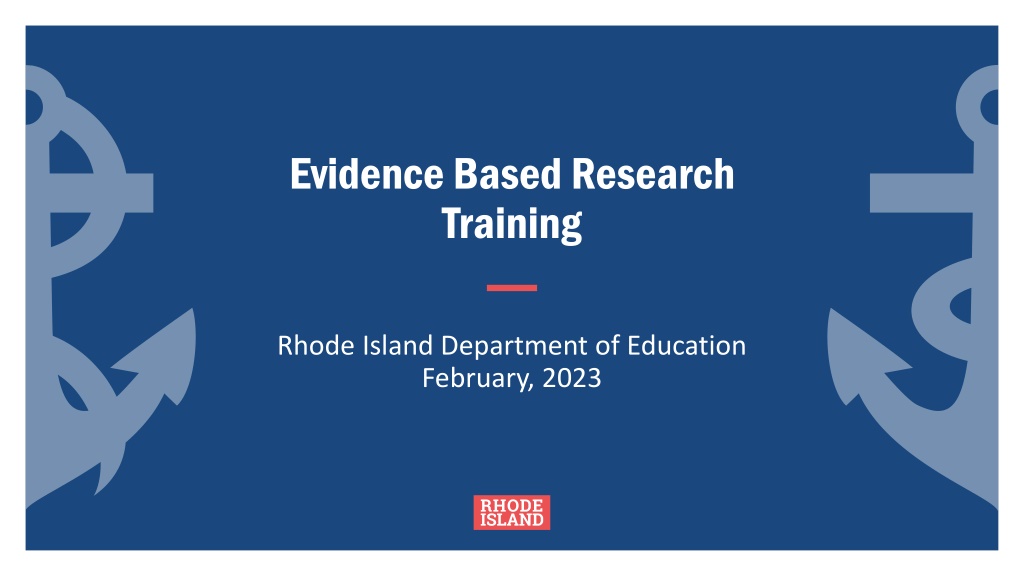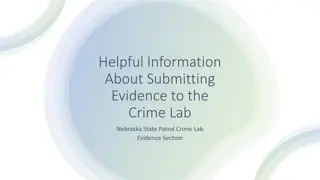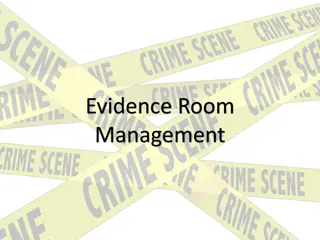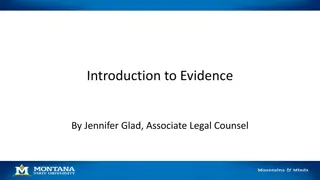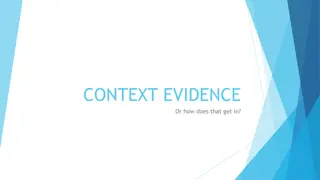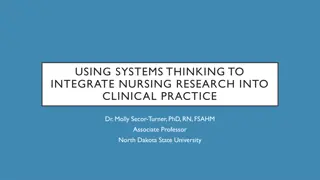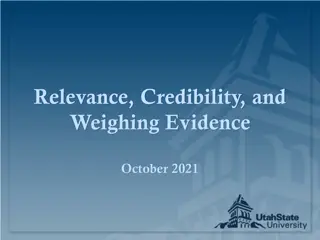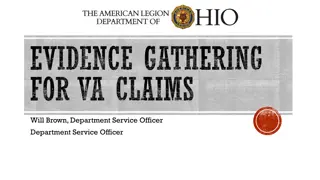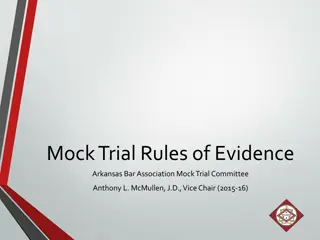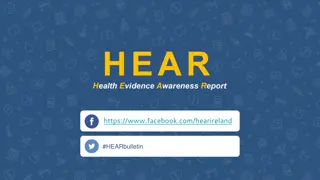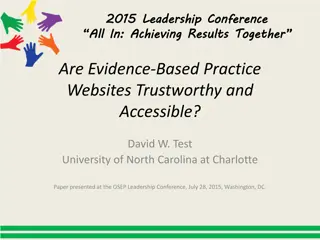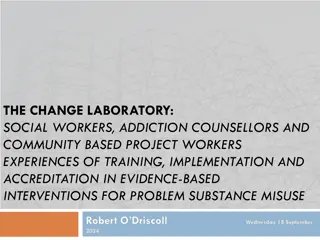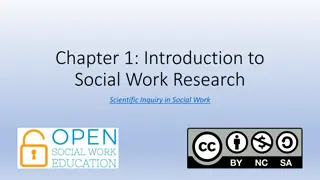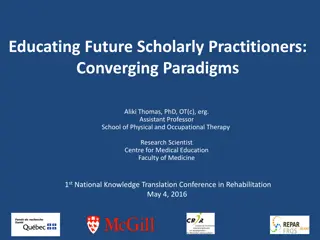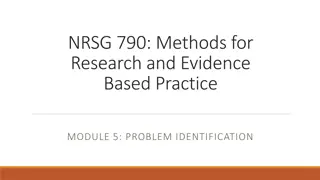Understanding Evidence-Based Research in Education
Enhance your knowledge of evidence-based research in education with a focus on ESSA's definition, tiers, and importance. Discover how it impacts Title II Funding Application and allowable activities. Explore federal funding programs, strategic planning, and required uses of funds for equitable access in education.
Download Presentation

Please find below an Image/Link to download the presentation.
The content on the website is provided AS IS for your information and personal use only. It may not be sold, licensed, or shared on other websites without obtaining consent from the author. Download presentation by click this link. If you encounter any issues during the download, it is possible that the publisher has removed the file from their server.
E N D
Presentation Transcript
Evidence Based Research Training Rhode Island Department of Education February, 2023
Agenda Today s purpose: Understand ESSA s definition of evidence-based research Understand the tiers of evidence-based research Understand importance of evidence-based research and how it connects to the Title II Funding Application Identify Title II, Part A allowable activities that require rigorous and relevant evidence 2
Clarifying the Why The Title II Team s goal is to get you to YES! Why does this matter? Evidence Based Research Why should they care? Where does the information? Recommend it is going in the document library Monitor- Succession Planning/ Knowledge Management
Federal Funding Programs in the CRP IDEA Programs ESEA Programs ESEA Programs Title I, Part A IDEA, Part B Title II, Part A IDEA, Preschool Title III Title IV, Part A 6
Required Uses of Funds: Equitable Access The Title II, Part A program is designed, among other things, to provide students from low-income families and minority students with greater access to effective teachers, principals, and other school leaders. LEAs MUST: Describe the LEA plan to identifying equity gaps equity gaps Describe how disparities will be addressed (induction for teachers, principals, or other school leaders, systematic coaching on academic instruction or leadership development) Submit annually within the CRP (LEA Part I section) SEA may deny Title II funding, if description is not submitted 8
Determining the Allowability of a Title II-A The activity aligned to one or more of the 4 pillars (purpose) of Title II, Part A-Program. Step 1 The activity allowable under Title II, Part A-Program, is based on data and data sources, and there is evidence-based research that indicates effectiveness. Step 2 The cost of an activity allowable under the Title II, Part A-Program; It is reasonable and necessary for performance of the grant, and It is allocable to the grant. Step 4 The activity: is not prohibited in ESEA; is not required for federal, State or local laws; and was not paid for with State, Local, or other Federal funds in the previous year. Step 5
LEA Grant Eligibility: Title II-A Who is eligible? Who is eligible? Teachers, paraprofessionals, principals, and other school leaders How are funds awarded? How are funds awarded? Grants are awarded to local school districts through a state grant application (CRP) process The amount of funding varies based on o Total number of qualifying students statewide and o Federal funds available for each fiscal year Funds are awarded by formula to each local school system. ESEA section 2102(a) 10
Defining Evidence Based Practices
The federal Elementary and Secondary Education Act (ESEA) requires LEAs to have an approved LEA Plan on file with the State to access their federal funds. It also emphasizes identification of evidence-based practices to support a high likelihood of success for implemented interventions. Every Student Succeeds Act Evidence Based Practices The Every Student Succeeds Act (ESSA) emphasizes the use of evidence-based activities, strategies, and interventions (collectively referred to as "interventions"). The term 'evidence-based,' (from section 8101(21)(A) of the ESEA) when used with respect to a State, local educational agency, or school activity, means an intervention that demonstrates a statistically significant effect on improving student outcomes or other relevant outcomes. Every Student Succeeds Act 12 12
Activity: Title II-A Evidence-Based Research Search How might our LEA use Title II-A funds to support an LEA initiative? 1. You will be provided with a list of common Title II interventions. 2. As a team, take 10 minutes to find an evidence-based research article that aligns with the intervention. 3. Identify which research tier your article would align to. 4. Complete the template to answer the following for your article (10 min): What is being implemented? Who is implementing? In what setting(s)? At what time(s)? To which students? And for what cost? Are the results statistically significant? Does the study attend to any groups of students that might be underserved or require additional supports? 15
Title II, Part A Title II, Part A Theory to Practice Theory to Practice Monitoring and Evaluation Monitoring and Evaluation
Purpose: Title II-A Title II-A funds can be used to support: Provide low Provide low- -income & & minority minority students greater greater access to to effective effective teachers, principals and principals and other school other school leaders income students access teachers, Increase the Increase the number of of effective effective teachers, teachers, principals and principals and other other school leaders school leaders number Improve Improve effectiveness effectiveness of of teachers, teachers, principals and principals and other school other school leaders Increase Increase student achievement achievement student leaders leaders . Services must be supplemental and based on a needs assessment, with input from stakeholders. ESSA, Section 4101 17
Purpose: Title II-A Title II-A activities must always be: Consistent with Title II purpose Reasonable, Necessary and Allocable Address the Learning Needs of all Students Sustainable Services must be supplemental and based on a needs assessment, with input from stakeholders. ESSA, Section 4101 18
Allowable Uses of Funds: Title II-A Coaching Academic Content Recruit & Retain Evaluation Systems Teaching of MLL, students with disabilities, and Early Childhood students STEM Formative assessment Trauma/mental illness Gifted students Library programs Recognize/prevent sexual abuse CTE and work-based learning Class Size Reduction Early Grades ELL Students with Disabilities Learning Communities Principal Leadership Teacher Leadership Induction Mentoring 19
Title III Title III English Language Acquisition
Purpose: Title III Title III funds are: Based on the number of MLL students enrolled in the district and in Private Schools located in the district Supplemental Supplemental funds available to local school districts and the same challenging state academic content and state academic content and grade level performance grade level performance standards standards expected of all other students challenging To ensure that these students are prepared to meet the English language proficiency standards 22
Cross Cutting Grant Requirements
Assurances The CRP provides LEAs with an opportunity to maximize and coordinate federal resources to improve student achievement. The CRP contains unique assurances for each program. LEAs must review, sign and commit to implementing these requirements every year. 24
Transferability Transfer from: Transfer to: Keep in mind, LEAs: Title I-A Title III Title IV-A Must conduct their needs assessment and begin equitable services consultation before making any decisions about transferring funds. Title II-A May then choose to transfer some, or all, of their funds from eligible programs, based on needs identified for improving student achievement. Title I-A Title II-A Title III Transferred funds must then meet the requirements of the program which they are transferred into, including equitable services requirements. Title IV-A Title I-A and Title III funds may not be transferred to other programs. 26
ESEA shifted program focus from core academic subjects to providing a well-rounded education. Well-Rounded Education in ESEA ESEA defines well-rounded education as courses, activities, and programming in subjects such as: English, reading or language arts, writing, science, technology, engineering, mathematics, foreign languages, civics and government, economics, arts, history, geography, computer science, music, career and technical education, health, physical education, and any other subject, as determined by the state or local educational agency, with the purpose of providing all students access to an enriched curriculum and educational experience. 27 ESEA Sec. 1114(b)(7)(ii); 1115(b)(2)(a) 27
Evidence Based Practices Title II Title II- -A A Title I Title I- -A A LEAs must conduct, with the meaningful involvement of parents and family members of participating Title I-A students, an annual evaluation of the content and effectiveness of the parent and family engagement policy in improving the academic quality of all Title I-A schools. LEAs must use the findings from this to design evidence- based strategies for more effective parental involvement. Allowable Evidence Tiers: 1, 2, 3 and 4. 28
Professional Development Title Title II II Title III Title III ESSA defines professional development as activities that are sustained, intensive, collaborative, job embedded, data-driven, personalized or based on information from an evaluation and support system, and classroom-focused. Improves instruction and assessment of MLLs Enhances ability of teachers and principals to implement curricula, assessment measures and practices, and instructional strategies for MLLs Increases English proficiency or subject matter knowledge, teaching knowledge, and teaching skills of teachers of MLLs Title II, Part A funds cannot be used to support stand alone, discreet professional development that does not connect to a larger school-wide or individualized plan. Is of sufficient intensity and duration to have a positive and lasting impact on the teachers performance in the classroom. LEAs may also use Title I-A, Title IV-A and IDEA funds to support professional development activities. 29
Parent and Family Engagement Title III Title III Title I, Part A Title I, Part A LEAs with allocations of $500,000 or more must spend at least 1% of their Title I-A funds on activities to assist families in improving student academic achievement. Parent, family, and community engagement activities that enhance or supplement LIEPs for MLLs are required. supplement LIEPs for MLLs are required. enhance or Community may include the local and extended network of organizations that exist to support the student and family and can include private, non-profit, for-profit, or faith-based organizations. Families may include relatives involved in the social, emotional, and academic support of the student; it expands beyond parents and guardians to include siblings, grandparents, aunts, uncles, cousins and others. LEAs may also spend funds to support parent and family engagement under Title IV-A and IDEA. ESEA encourages LEAs to coordinate their parent and family engagement efforts. 30
Equitable Services for Private Schools LEAs must follow the individual program rules and use funds to provide equitable services to eligible students, teachers and families for all of programs in the CRP. For Titles II, III, IV-A, IDEA, Part B and Preschool - LEAs must consult with all private schools within regardless of student s district of residence. within district boundaries For Title I-A - Funds and services follow resident students district boundaries. follow resident students, including those attending private schools outside of the Note: These requirements are not applicable to State run charter schools. 31
Equitable Services Ombud The State-designated Ombud monitors and enforces private school consultation and equitable service requirements to help ensure equitable services are provided to private school children, teachers and other educational personnel. Rhode Island s designated Ombud is: Anthony Cottone Rhode Island Department of Education 255 Westminster Street Providence, RI 02903 (401) 222-8933 ombudsman@ride.ri.gov Please note: If private school officials believe the district did not meet consultation or other requirements, they may file a complaint with RIDE. 32 Lorem ipsum dolor sit amet, consectetur adipiscing elit, sed do eiusmod tempor incididunt ut labore et dolore.
Allowable Costs For all grant programs, funding requests must be: Allowable Allowable under individual program rules. Necessary Necessary for the proper and efficient performance of the program. Reasonable Reasonable in that it would be a cost that a prudent person would incur under similar circumstances. Allocable Allocable to the program, such that the program must benefit in proportion to the amount charged to the federal program. Authorized Authorized, or otherwise not prohibited, by federal, state or local rules. Documented Documented to justify all fiscal and program requirements. 2 CFP Part 200, Subpart E
ESEA Prohibitions ESEA fundsmay not be used: for construction, renovation, or repair of any school facility, except as authorized under this Act; for transportation unless otherwise authorized under this Act; to develop or distribute materials, or operate programs or courses of instruction directed at youth, that are designed to promote or encourage sexual activity, whether homosexual or heterosexual; to distribute or to aid in the distribution by any organization of legally obscene materials to minors on school grounds; to provide sex education or HIV-prevention education in schools unless that instruction is age appropriate and includes the health benefits of abstinence; to operate a program of contraceptive distribution in schools; or for the provision to any person of a dangerous weapon or training in the use of a dangerous weapon. 34
Activity: Braiding Funds to Support Students Using a new LEA initiative and action steps, consider how the LEA might use funds from Using a new LEA initiative and action steps, consider how the LEA might use funds from Titles I, II, III, IV Titles I, II, III, IV- -A and IDEA funds to support their initiatives and/or action steps? A and IDEA funds to support their initiatives and/or action steps? 1. Review the provided LEA Plan with you table partner(s). BLUE for Title I-A YELLOW for Title II 2. Discuss how funds could be used or braided . ORANGE for Title III PINK for Title IV-A 3. Use the following marker colors to highlight potentially fundable activities: GREEN marker for IDEA 35
Questions? Questions? 36
Grants Team Contact Information: Title II, Part A Barrington, Beacon, Blackstone Academy, Bristol-Warren, Burrillville, Chariho, Compass, Coventry, EWG, Foster, Foster-Glocester, Glocester, Greene, Highlander, International, Jamestown, Learning Community, Lincoln, Little Compton, Middletown, Narragansett, New Shoreham, North Providence, Nowell, Providence , Providence Prep, Segue, Smithfield, Warwick, West Bay, Westerly Mary Keenan 222-8497 Mary.keenan@ride.ri.gov Blackstone Valley Prep, Central Falls, Charette, Cranston, DCYF, East Greenwich, East Providence, Hppe, Johnston, Kingston Hill, MET, Newport, North Kingstown, Paul Cuffee, Portsmouth, RINI, RISE, Scituate, South Kingstown, Southside, TAPA, UCAP, Village Green, West Warwick, Barrington, Bristol- Warren, Burrillville, East Greenwich, and North Smithfield Katie Jones 222-8174 Katie.jones@ride.ri.gov Hilda Portzeba 222-8891 Hilda.Potrzeba@ride.ri.gov Achievement First, Cumberland, Davies, North Smithfield, Pawtucket, Portsmouth, RI School for the Deaf, South Kingstown, Tiverton, and Woonsocket 38
Grants Team Contact Information: Fiscal Grant Officers Grant Officers Finance Director Finance Director Lisa Ellis Lisa Ellis Phone: 222 Phone: 222- -8954 e e- -mail: mail: lisa.ellis@ride.ri.gov lisa.ellis@ride.ri.gov Mark Dunham Mark Dunham Phone: Phone: 222 e e- -mail: mail: mark 8954 222- -4647 4647 mark. .dunham dunham@ride.ri.gov @ride.ri.gov Crystal Martin Crystal Martin Phone: Phone: 222 e e- -mail: mail: crystal 222- -8482 8482 crystal. .martin Federal Grants Administrator Federal Grants Administrator David Luther David Luther Phone: Phone: 222 222- -4652 4652 e e- -mail: mail: david david. .luther luther@ride.ri.gov martin@ride.ri.gov @ride.ri.gov Dalila Townes Dalila Townes Phone: Phone: 222 e e- -mail: mail: dalila @ride.ri.gov 222- -8171 8171 dalila. .townes townes@ride.ri.gov @ride.ri.gov Anthony Anthony Vescera Phone: Phone: 222 222- -4653 e e- -mail: mail: anthony anthony. .vescera Vescera 4653 vescera@ride.ri.gov @ride.ri.gov 39
